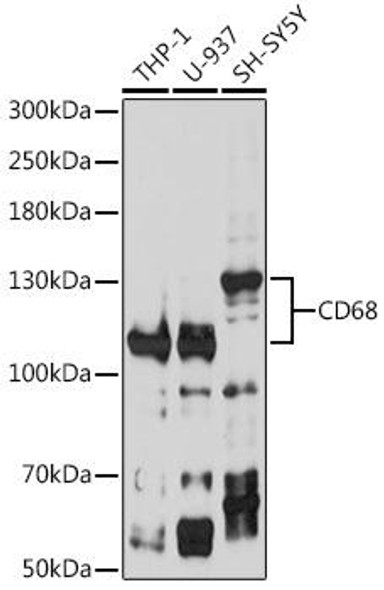Description
Anti-CD68 Antibody (CAB15037)
The CD68 Polyclonal Antibody (CAB15037) is a valuable tool for researchers studying CD68, a transmembrane glycoprotein associated with lysosomes and macrophages. This rabbit-raised antibody is highly specific to human samples and has been validated for use in Western blot applications. By binding to the CD68 protein, this antibody allows for the detection and analysis of CD68 expression in various cell types, making it an essential component for studies in immunology, inflammation, and cancer research.
CD68, also known as macrosialin, is a marker for macrophages and plays a crucial role in phagocytosis and antigen presentation. Its involvement in immune response and inflammation makes it a key player in diseases such as cancer, infectious diseases, and neurodegenerative disorders. Understanding the function of CD68 is essential for the development of targeted therapies that can modulate macrophage activity and immune response in these disease settings.
| Antibody Name: | Anti-CD68 Antibody |
| Antibody SKU: | CAB15037 |
| Antibody Size: | 20uL, 50uL, 100uL |
| Application: | WB IHC IF |
| Reactivity: | Human, Mouse |
| Host Species: | Rabbit |
| Immunogen: | Recombinant fusion protein containing a sequence corresponding to amino acids 16-200 of human CD68 (NP_001242.2). |
| Application: | WB IHC IF |
| Recommended Dilution: | WB 1:500 - 1:2000 IHC 1:50 - 1:200 IF 1:50 - 1:200 |
| Reactivity: | Human, Mouse |
| Positive Samples: | U-937, Mouse lung |
| Immunogen: | Recombinant fusion protein containing a sequence corresponding to amino acids 16-200 of human CD68 (NP_001242.2). |
| Purification Method: | Affinity purification |
| Storage Buffer: | Store at -20'C. Avoid freeze / thaw cycles. Buffer: PBS with 0.02% sodium azide, 50% glycerol, pH7.3. |
| Isotype: | IgG |
| Sequence: | AAQG TGND CPHK KSAT LLPS FTVT PTVT ESTG TTSH RTTK SHKT TTHR TTTT GTTS HGPT TATH NPTT TSHG NVTV HPTS NSTA TSQG PSTA THSP ATTS HGNA TVHP TSNS TATS PGFT SSAH PEPP PPSP SPSP TSKE TIGD YTWT NGSQ PCVH LQAQ IQIR VMYT TQGG GEAW GISV LNPN K |
| Gene ID: | 968 |
| Uniprot: | P34810 |
| Cellular Location: | Cell membrane, Endosome membrane, Lysosome membrane, Single-pass type I membrane protein, Single-pass type I membrane protein |
| Calculated MW: | 31kDa/34kDa/37kDa |
| Observed MW: | 70-80KDa |
| Synonyms: | CD68, GP110, LAMP4, SCARD1 |
| Background: | This gene encodes a 110-kD transmembrane glycoprotein that is highly expressed by human monocytes and tissue macrophages. It is a member of the lysosomal/endosomal-associated membrane glycoprotein (LAMP) family. The protein primarily localizes to lysosomes and endosomes with a smaller fraction circulating to the cell surface. It is a type I integral membrane protein with a heavily glycosylated extracellular domain and binds to tissue- and organ-specific lectins or selectins. The protein is also a member of the scavenger receptor family. Scavenger receptors typically function to clear cellular debris, promote phagocytosis, and mediate the recruitment and activation of macrophages. Alternative splicing results in multiple transcripts encoding different isoforms. |
| UniProt Protein Function: | CD68: Could play a role in phagocytic activities of tissue macrophages, both in intracellular lysosomal metabolism and extracellular cell-cell and cell-pathogen interactions. Binds to tissue- and organ-specific lectins or selectins, allowing homing of macrophage subsets to particular sites. Rapid recirculation of CD68 from endosomes and lysosomes to the plasma membrane may allow macrophages to crawl over selectin-bearing substrates or other cells. Belongs to the LAMP family. 2 isoforms of the human protein are produced by alternative splicing. |
| UniProt Protein Details: | Protein type:Cell surface; Membrane protein, integral Chromosomal Location of Human Ortholog: 17p13 Cellular Component: membrane; lysosomal membrane; plasma membrane; integral to membrane; endosome membrane |
| NCBI Summary: | This gene encodes a 110-kD transmembrane glycoprotein that is highly expressed by human monocytes and tissue macrophages. It is a member of the lysosomal/endosomal-associated membrane glycoprotein (LAMP) family. The protein primarily localizes to lysosomes and endosomes with a smaller fraction circulating to the cell surface. It is a type I integral membrane protein with a heavily glycosylated extracellular domain and binds to tissue- and organ-specific lectins or selectins. The protein is also a member of the scavenger receptor family. Scavenger receptors typically function to clear cellular debris, promote phagocytosis, and mediate the recruitment and activation of macrophages. Alternative splicing results in multiple transcripts encoding different isoforms. [provided by RefSeq, Jul 2008] |
| UniProt Code: | P34810 |
| NCBI GenInfo Identifier: | 147744552 |
| NCBI Gene ID: | 968 |
| NCBI Accession: | P34810.2 |
| UniProt Secondary Accession: | P34810,Q53HR6, Q53XI3, Q96BI7, B4DVT4, |
| UniProt Related Accession: | P34810 |
| Molecular Weight: | 354 |
| NCBI Full Name: | Macrosialin |
| NCBI Synonym Full Names: | CD68 molecule |
| NCBI Official Symbol: | CD68 |
| NCBI Official Synonym Symbols: | GP110; LAMP4; SCARD1 |
| NCBI Protein Information: | macrosialin; CD68 antigen; macrophage antigen CD68; scavenger receptor class D, member 1 |
| UniProt Protein Name: | Macrosialin |
| UniProt Synonym Protein Names: | Gp110; CD_antigen: CD68 |
| Protein Family: | Macrosialin |
| UniProt Gene Name: | CD68 |
| UniProt Entry Name: | CD68_HUMAN |



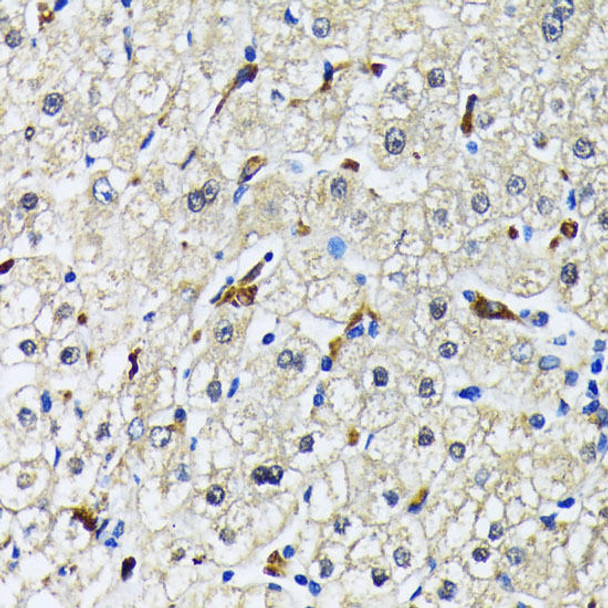
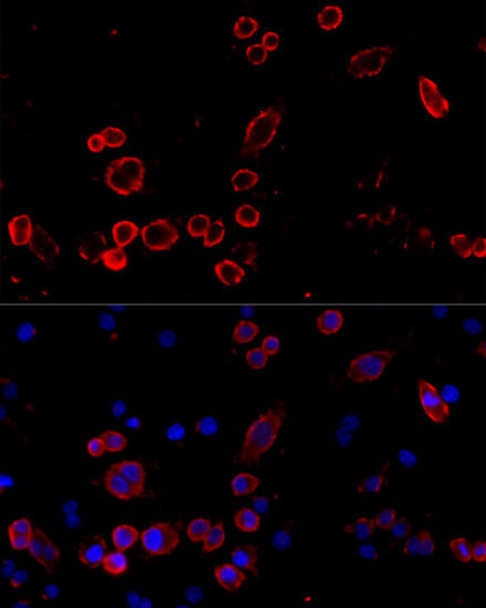




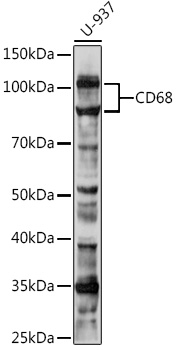
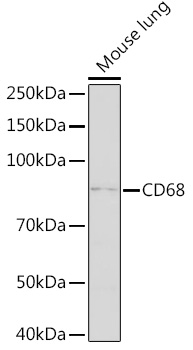
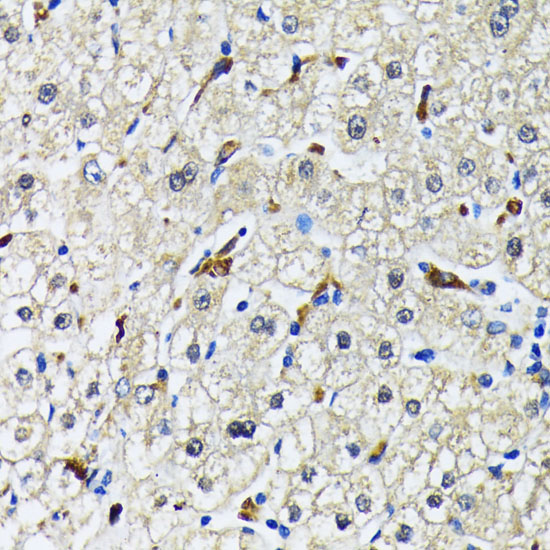
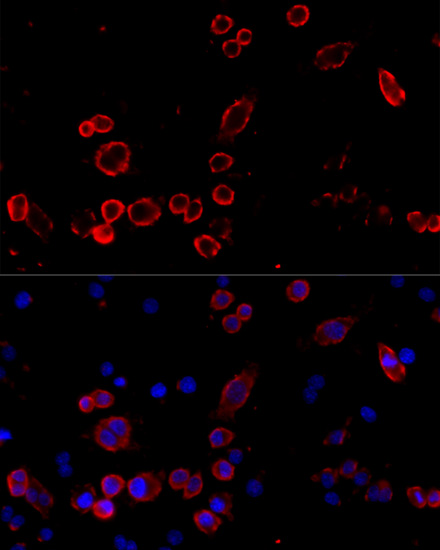

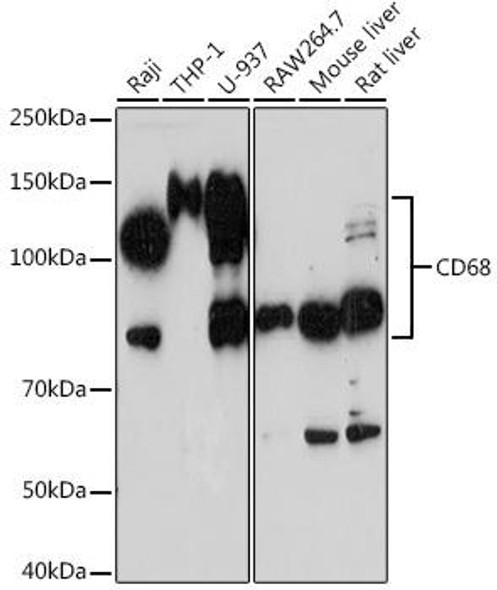



![GenieFluor 647 Anti-Human CD68 Antibody [Y1/82A] (AGEL3314) GenieFluor 647 Anti-Human CD68 Antibody [Y1/82A] (AGEL3314)](https://cdn11.bigcommerce.com/s-h68l9z2lnx/images/stencil/590x590/products/221435/607316/geniefluor-647-anti-human-cd68-antibody-y182a-agel3314__53489.1707500815.jpg?c=2)
![GenieFluor 488 Anti-Human CD68 Antibody [Y1/82A] (AGEL3313) GenieFluor 488 Anti-Human CD68 Antibody [Y1/82A] (AGEL3313)](https://cdn11.bigcommerce.com/s-h68l9z2lnx/images/stencil/590x590/products/221434/606191/geniefluor-488-anti-human-cd68-antibody-y182a-agel3313__64176.1707497231.jpg?c=2)
